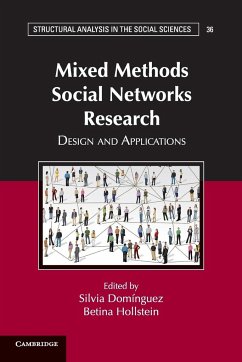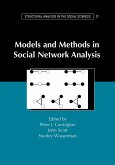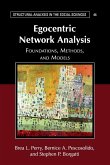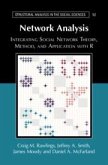Mixed Methods Social Networks Research
Herausgeber: Domínguez, Silvia; Hollstein, Betina
Mixed Methods Social Networks Research
Herausgeber: Domínguez, Silvia; Hollstein, Betina
- Broschiertes Buch
- Merkliste
- Auf die Merkliste
- Bewerten Bewerten
- Teilen
- Produkt teilen
- Produkterinnerung
- Produkterinnerung
This volume demonstrates the potential of mixed-methods designs for researching social networks and the utilization of social networks for other research.
Andere Kunden interessierten sich auch für
![Models and Methods in Social Network Analysis Models and Methods in Social Network Analysis]() Peter J. Carrington / John Scott / Stanley Wasserman (eds.)Models and Methods in Social Network Analysis48,99 €
Peter J. Carrington / John Scott / Stanley Wasserman (eds.)Models and Methods in Social Network Analysis48,99 €![Personal Networks Personal Networks]() Personal Networks75,99 €
Personal Networks75,99 €![Economic Networks Economic Networks]() Thomas J. SargentEconomic Networks43,99 €
Thomas J. SargentEconomic Networks43,99 €![Egocentric Network Analysis Egocentric Network Analysis]() Brea L. Perry (Indiana University)Egocentric Network Analysis39,99 €
Brea L. Perry (Indiana University)Egocentric Network Analysis39,99 €![In Search of Respect In Search of Respect]() Philippe Bourgois (San Francisco State University)In Search of Respect39,99 €
Philippe Bourgois (San Francisco State University)In Search of Respect39,99 €![Network Analysis Network Analysis]() Craig M. Rawlings (North Carolina Duke University)Network Analysis43,99 €
Craig M. Rawlings (North Carolina Duke University)Network Analysis43,99 €![Mixed Methods Research Mixed Methods Research]() Vicki L. Plano ClarkMixed Methods Research73,99 €
Vicki L. Plano ClarkMixed Methods Research73,99 €-
-
-
This volume demonstrates the potential of mixed-methods designs for researching social networks and the utilization of social networks for other research.
Hinweis: Dieser Artikel kann nur an eine deutsche Lieferadresse ausgeliefert werden.
Hinweis: Dieser Artikel kann nur an eine deutsche Lieferadresse ausgeliefert werden.
Produktdetails
- Produktdetails
- Structural Analysis in the Social Sciences
- Verlag: Cambridge University Press
- Seitenzahl: 406
- Erscheinungstermin: 15. Juni 2018
- Englisch
- Abmessung: 229mm x 152mm x 22mm
- Gewicht: 552g
- ISBN-13: 9781107631052
- ISBN-10: 110763105X
- Artikelnr.: 41023799
- Herstellerkennzeichnung
- Libri GmbH
- Europaallee 1
- 36244 Bad Hersfeld
- gpsr@libri.de
- Structural Analysis in the Social Sciences
- Verlag: Cambridge University Press
- Seitenzahl: 406
- Erscheinungstermin: 15. Juni 2018
- Englisch
- Abmessung: 229mm x 152mm x 22mm
- Gewicht: 552g
- ISBN-13: 9781107631052
- ISBN-10: 110763105X
- Artikelnr.: 41023799
- Herstellerkennzeichnung
- Libri GmbH
- Europaallee 1
- 36244 Bad Hersfeld
- gpsr@libri.de
Part I. General Issues: 1. Mixed methods social network research: an
introduction Betina Hollstein; 2. Social network research Peter J.
Carrington; 3. Triangulation and validity of network data Andreas Wald; 4.
A network analytical four-level concept for an interpretation of social
interaction in terms of structure and agency Roger Häussling; Part II.
Mixed Methods Applications: 5. Social networks, social influence, and
fertility in Germany: challenges and benefits of applying a parallel mixed
methods design Laura Bernardi, Sylvia Keim and Andreas Klärner; 6. Two
sides of the same coin: the integration of personal network analysis with
ethnographic and psychometric strategies in the study of acculturation
Isidro Maya Jariego and Silvia Dominguez; 7. Adaptation to new legal
procedures in rural China: integrating survey and ethnographic data
Christine Avernius and Jeffrey C. Johnson; 8. Mixing ethnography and
information technology data mining to visualize innovation networks in
global networked organizations Julia Gluesing, Kenneth Riopelle and James
A. Danowski; Part III. New Methodological Approaches Used in Mixed Methods
Designs: 9. Fuzzy set analysis of network data as mixed method personal
networks and the transition from school to work Betina Hollstein and
Claudius Wagemann; 10. Reconstructing social networks through text
analysis: from text networks to narrative actor networks Joan Miquel Verd
and Carlos Lozares; 11. Give meaning to social networks: methodology for
conducting and analyzing interviews based on personal network
visualizations José Luis Molina, Isidro Maya Jariego and Christopher
McCarty; 12. Simulating the social networks and interactions of poor
immigrants Bruce Rogers and Cecilia Menjívar.
introduction Betina Hollstein; 2. Social network research Peter J.
Carrington; 3. Triangulation and validity of network data Andreas Wald; 4.
A network analytical four-level concept for an interpretation of social
interaction in terms of structure and agency Roger Häussling; Part II.
Mixed Methods Applications: 5. Social networks, social influence, and
fertility in Germany: challenges and benefits of applying a parallel mixed
methods design Laura Bernardi, Sylvia Keim and Andreas Klärner; 6. Two
sides of the same coin: the integration of personal network analysis with
ethnographic and psychometric strategies in the study of acculturation
Isidro Maya Jariego and Silvia Dominguez; 7. Adaptation to new legal
procedures in rural China: integrating survey and ethnographic data
Christine Avernius and Jeffrey C. Johnson; 8. Mixing ethnography and
information technology data mining to visualize innovation networks in
global networked organizations Julia Gluesing, Kenneth Riopelle and James
A. Danowski; Part III. New Methodological Approaches Used in Mixed Methods
Designs: 9. Fuzzy set analysis of network data as mixed method personal
networks and the transition from school to work Betina Hollstein and
Claudius Wagemann; 10. Reconstructing social networks through text
analysis: from text networks to narrative actor networks Joan Miquel Verd
and Carlos Lozares; 11. Give meaning to social networks: methodology for
conducting and analyzing interviews based on personal network
visualizations José Luis Molina, Isidro Maya Jariego and Christopher
McCarty; 12. Simulating the social networks and interactions of poor
immigrants Bruce Rogers and Cecilia Menjívar.
Part I. General Issues: 1. Mixed methods social network research: an
introduction Betina Hollstein; 2. Social network research Peter J.
Carrington; 3. Triangulation and validity of network data Andreas Wald; 4.
A network analytical four-level concept for an interpretation of social
interaction in terms of structure and agency Roger Häussling; Part II.
Mixed Methods Applications: 5. Social networks, social influence, and
fertility in Germany: challenges and benefits of applying a parallel mixed
methods design Laura Bernardi, Sylvia Keim and Andreas Klärner; 6. Two
sides of the same coin: the integration of personal network analysis with
ethnographic and psychometric strategies in the study of acculturation
Isidro Maya Jariego and Silvia Dominguez; 7. Adaptation to new legal
procedures in rural China: integrating survey and ethnographic data
Christine Avernius and Jeffrey C. Johnson; 8. Mixing ethnography and
information technology data mining to visualize innovation networks in
global networked organizations Julia Gluesing, Kenneth Riopelle and James
A. Danowski; Part III. New Methodological Approaches Used in Mixed Methods
Designs: 9. Fuzzy set analysis of network data as mixed method personal
networks and the transition from school to work Betina Hollstein and
Claudius Wagemann; 10. Reconstructing social networks through text
analysis: from text networks to narrative actor networks Joan Miquel Verd
and Carlos Lozares; 11. Give meaning to social networks: methodology for
conducting and analyzing interviews based on personal network
visualizations José Luis Molina, Isidro Maya Jariego and Christopher
McCarty; 12. Simulating the social networks and interactions of poor
immigrants Bruce Rogers and Cecilia Menjívar.
introduction Betina Hollstein; 2. Social network research Peter J.
Carrington; 3. Triangulation and validity of network data Andreas Wald; 4.
A network analytical four-level concept for an interpretation of social
interaction in terms of structure and agency Roger Häussling; Part II.
Mixed Methods Applications: 5. Social networks, social influence, and
fertility in Germany: challenges and benefits of applying a parallel mixed
methods design Laura Bernardi, Sylvia Keim and Andreas Klärner; 6. Two
sides of the same coin: the integration of personal network analysis with
ethnographic and psychometric strategies in the study of acculturation
Isidro Maya Jariego and Silvia Dominguez; 7. Adaptation to new legal
procedures in rural China: integrating survey and ethnographic data
Christine Avernius and Jeffrey C. Johnson; 8. Mixing ethnography and
information technology data mining to visualize innovation networks in
global networked organizations Julia Gluesing, Kenneth Riopelle and James
A. Danowski; Part III. New Methodological Approaches Used in Mixed Methods
Designs: 9. Fuzzy set analysis of network data as mixed method personal
networks and the transition from school to work Betina Hollstein and
Claudius Wagemann; 10. Reconstructing social networks through text
analysis: from text networks to narrative actor networks Joan Miquel Verd
and Carlos Lozares; 11. Give meaning to social networks: methodology for
conducting and analyzing interviews based on personal network
visualizations José Luis Molina, Isidro Maya Jariego and Christopher
McCarty; 12. Simulating the social networks and interactions of poor
immigrants Bruce Rogers and Cecilia Menjívar.








